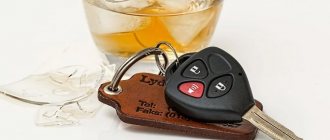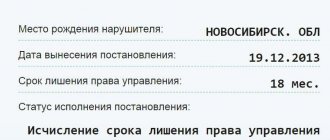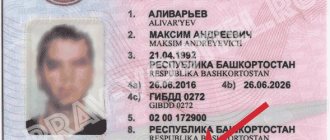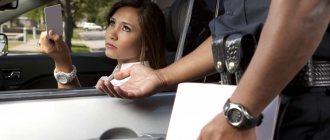AutoYurait.rf / Driver's license
Back
Published: 11/17/2018
Reading time: 1 minute
0
711
Long-term confiscation of a document can be an extreme measure of punishment for malicious violation of traffic rules and driving. But in some cases, only it can reduce the number of accidents on the roads and reduce the overall number of offenses. Currently, the deadlines are set conditionally; the measure has both supporters and opponents.
- Is there a law on lifelong disqualification?
- Why is a driver's license revoked for life?
- Lifetime deprivation of rights as a type of strict punishment
- Who carries out the lifelong deprivation of the right to drive a vehicle?
- conclusions
For what violations can a driver's license be revoked?
The Administrative Code conventionally divides all possible violations into groups that differ in severity. The easiest of them include the following road situations:
- Driving a car without state signs;
- Exceeding the permissible speed by no more than 60 km/h;
- Entering the railway tracks in the wrong place or crossing the barrier incorrectly;
- Intersection of double solid;
- Secondary disregard of a red traffic light within a period of 12 months;
- Ignoring special-purpose vehicles with sirens on (ambulance, fire, police and gas service).
For the listed offenses, the motorist risks losing his license for 3 months, receiving an accompanying fine (no more than 5 thousand rubles). For violations of moderate severity, the Code of Administrative Offenses provides for the confiscation of the certificate for a period of 6 to 12 months. And you can receive such a punishment in the following cases:
- Illegal use of special signals and flashing lights on vehicles;
- Applying inscriptions and stripes on the vehicle related to operational services;
- Driving a self-propelled vehicle under the influence of alcohol or drugs;
- Transferring a car into the hands of a minor;
- Exceeding the permissible speed by more than 80 km/h;
- Committing an accident resulting in victims with minor injuries;
- Refusal of medical examination (the crust is confiscated even if the driver was not drunk);
- Fleeing from the scene of an incident;
- Drinking or drug use after an accident, but before a medical examination.
Finally, let’s look at especially serious crimes for which the driver’s license is confiscated for life. These include:
- Driving head-on into oncoming traffic, driving incorrectly at an intersection, or speeding at a pedestrian crossing, causing the death of other motorists or pedestrians;
- Hitting a pedestrian or provoking an accident, resulting in serious injuries or deaths;
- Committing any violation resulting in the death of two or more people.
In addition to the fact that a citizen’s record is confiscated for life, he also faces imprisonment of up to 5 years. From what point does the period of deprivation of a driver’s license begin to be calculated, and under what circumstances it can be mitigated, we will consider further.
Reasons or why extreme measures are needed
Statistics show that in recent years Russia has consistently been among the leaders in road accidents.
It should be noted that since 2014 there has been a positive change in the data, but this does not give reason to expect that the problem will resolve itself.
Drunk driving is cited as the main reason for the frightening number of deaths and injuries. At the same time, as it turned out, neither fines nor legislation can stop drunk driving.
So what is the root of evil? Are the fines not ruinous enough? In the Russian mentality? In the imperfection of legislation? In something else?
To the above facts we can add official data that every year traffic police officers detain from 600 to 700 thousand potential criminals - drivers who get behind the wheel while intoxicated. More than half of them are deprived of their rights.
However, against the background of this and very, very serious fines and terms of suspension from driving a vehicle, the situation remains more than critical.
After drinking, the sources of accidents on Russian roads are criminal recklessness, speeding, driving into oncoming traffic, dangerous maneuvering and failure to maintain distance.
How to stop this? How to instill in drivers a driving culture and respect for other road users? Why is it not like this in our country, for example in Sweden, where driving while intoxicated has the status of almost the most serious crime, and the death rate on the roads does not exceed 600-700 people a year?
Punishments for drivers for drunkenness in Russia and abroad:
- USA - driving a vehicle under the influence of alcohol or drugs - first time - $300 plus license deprivation for 6 months. Such a revealed fact within 10 years will result in a fine of $5,000 and the possibility of being in prison for six months. A drunken culprit in an accident with victims can be sentenced to 10 years in prison;
- Spain and Finland - a drunk driver is clearly a criminal and his punishment for this is 2 and 4 years in prison, respectively;
- UK - drunk driving is assessed by law at 7,200 euros; For reference: the first driver to pay a fine for driving while intoxicated was an Englishman. Back in September 1897, this offense was assessed at only $130, which was almost 70 times less than today's fine.
- France - A drunk driver stopped by a police officer is unconditionally barred from going to court. An accident with serious consequences is punishable by a fine of 150,000 euros and serving at least ten years in prison. By the way, French motorists are required to have breathalyzers in their cars, and their absence is punishable by a fine;
- China - an accident by a drunk driver, resulting in death, can end for the culprit with nothing less than execution;
- Japan is distinguished by its uniqueness in the fight for driver sobriety. So, if a person is found to be drunk driving, the culprit faces a fine of $8,700 and five years in prison. At the same time, each adult passenger who was driven by a sober driver is also subject to a fine of $3,000.
- Russia. According to current legislation, the fact of driving a vehicle while intoxicated threatens with the deprivation of a driver’s license for up to two years with the obligatory payment of a fine of thirty thousand rubles.
A similar punishment awaits the owner of the car if he transfers control to another person who is under the influence of alcohol or drugs.
A recurrence of this offense, committed less than a year after deprivation of rights under the article on drunkenness, may result in a more severe verdict of the law - removal from the ability to drive a vehicle for up to three years and a fine of up to three hundred thousand rubles.
Let us note that in this case the Criminal Code also comes into force, where the offender may receive an additional two years of imprisonment.
There is no doubt that the law is harsh. But for some reason its effectiveness leaves much to be desired.
Russian legislators have long been searching for more effective tools to improve the situation with road deaths. It seems that the last argument left is the lifelong deprivation of a driver’s license for drunkenness.
Rules for calculating time limits for deprivation of a driver's license
Based on the traffic police regulations, no one can take a person’s license by force. The withdrawal procedure occurs in the following order:
- A decree is issued against the violator, which is noted in the traffic police database;
- After ten days from the moment the employee stopped, the drawn up protocol becomes legally valid;
- Three days after the final court verdict to confiscate the driver’s license, the driver voluntarily transfers the document to the nearest traffic police agency for temporary storage.
Not many people know at what point the period of deprivation of rights begins. Therefore, car enthusiasts often try to return the crust even before the end of the penalty period.
Start and end date
Most motorists are sure that the start of the seizure period is counted from the moment the protocol is drawn up. However, in reality, the state gives each citizen 10 days to petition if the offender refuses the charges against him. And this time is not taken into account in the punishment.
After ten days from the date of filling out the resolution, when the court verdict takes full force, the reduction in the period of arrest of the VU still does not begin. After all, according to the regulations, a person is given three more days to voluntarily transfer the crust to the MREO unit. And only when the document is in the hands of the employees will the calculation of the period of deprivation of the right to drive the vehicle begin, which means the legal start of the timer.
Moreover, if the driver’s license was confiscated for debts, then the countdown will begin immediately after payment of all material penalties, even if the document is submitted on time. An exceptional case can only be considered a lifelong deprivation of the right to drive a vehicle.
Minimum and maximum
The Code of Administrative Offenses of the Russian Federation establishes a clear time frame for the arrest of a device, both for administrative violators and for criminal ones. Based on its articles, the minimum limit for this punishment can be considered a period of 90 days, which is imposed on motorists for slight deviations from the rules.
It is important to know! The maximum period of deprivation of rights reaches 2 years, and it is applied, as a rule, in conjunction with an impressive fine (up to 30 thousand rubles for driving while intoxicated).
At the same time, during the entire period of punishment, the State Traffic Inspectorate undertakes to keep the seized document, since if it is lost, the cost of obtaining a new document will be borne by the citizen.
Interruption of the period of deprivation of the right to drive a vehicle
Many motorists, checking the status of their license on the official website of the MREO, encounter an inscription with the following content: the calculation of the period for deprivation of the right to drive a vehicle has been interrupted, but not everyone can guess what this message means. After all, it can appear even if the crust is in storage at the State Traffic Inspectorate. The reasons for this situation may be:
- Ignoring fines and debts that resulted in the seizure of the driver's license (in the absence of payment of the loan, alimony and other material penalties, the resolution does not become executed);
- Untimely updating of the traffic police database (the message disappears when the page is reloaded, after 1-2 days).
The only other circumstance that remains is the late delivery of the certificate. But this is the direct fault of the driver.
Why can a driver be deprived of his license?
Setting a maximum period for depriving a driver of his rights is permitted in the following cases:
- Driving a vehicle under the influence of alcohol, drugs or psychotropic substances. However, in order to deprive a person of his rights in this case, it is necessary to prove the fact of a violation - the suspect must be sent to a medical institution for examination. If a motorist for some reason refuses to undergo an examination, traffic police officers have the right to issue him a decree and confiscate the vehicle, but in this case it is better to record the incident with cameras.
- The driver re-passed his license and got behind the wheel of the car again while intoxicated.
- The motorist violated the speed limit established on the road section.
- The driver left the scene of a traffic accident for which he was the culprit.
For all of the above penalties, a motorist may be subject to several types of administrative and criminal liability. These include confiscation of a driver’s license for up to several years.
Are the terms of deprivation of a driver's license summed up under different protocols?
It is no secret to most motorists that if several deviations from traffic rules are recorded simultaneously, the values from all protocols will not be summed up. Instead, employees will choose the largest fine for the article violated by the citizen, and will make a decision only on it. But does this rule apply to the timing of the withdrawal of a driving license?
The answer to the question posed is given by Art. 12 Part 27 of the Code of Administrative Offenses, which clearly states that the periods of seizure of rights under the issued protocols must be summed up. Moreover, this procedure takes place in full, without reducing the sentence for similar violations.
Attention! Therefore, even if the rules are slightly ignored, you can be left without a vehicle for several years.
Counting example
To better understand the process of summing up punishments, a specific example should be considered. Let’s say that a motorist causes an accident, which results in injuries. Before the police and medical staff arrive, he manages to drink alcohol, and he also refuses further examination.
Thus, police officers record three serious violations, providing for deprivation of rights for a period of 6 to 12 months. In total, the crust will be arrested for one and a half to three years with additional financial penalties. And this period will not be the maximum. After all, depending on the number of protocols, it can grow further. But its expiration will begin only after the voluntary surrender of the license and payment of all fines.
Who has the authority to make a decision?
The most common case when a citizen driving a car is deprived of a driver's license is when he is intoxicated. This can be confirmed by sending him for a medical examination and obtaining the appropriate conclusion from a narcologist.
After a person has been detained and the violation of the law has been confirmed, the police officer draws up a protocol indicating the person’s details, his place of registration and residence, the type and nature of the offense. The driver must sign this document and also indicate whether he agrees with the data described in the protocol.
Only a judicial authority has the right to conduct a process to deprive a citizen of the right to drive a car, so inspection staff should not take away his license at the scene of the offense.
All documents drawn up by a police officer are sent to the magistrate's court, where the case is considered in the presence of a citizen. Given his right to defend his own position, he may disagree with the accusation. If a person is found guilty of committing an act, the court issues a resolution specifying the penalties applied to him for the purpose of sentencing and prevention. The driver surrenders his license to the police within 3 working days after the decision has been issued.
Is it possible to lose a driver's license for debt?
Is there a statute of limitations for deprivation of rights?
To the relief of all motorists, decisions made to confiscate licenses have their own statute of limitations, which is 3 months from the moment the incident was recorded. After this period, the court no longer has the right to make a decision on the seizure of the crust.
If, when checking the status of your driver’s license online, you find a red inscription: the calculation of the period of deprivation of the right to drive a vehicle has been interrupted, then this means that the regulatory authority has violated the mentioned law, and you can easily file a claim to have the penalty cancelled. Moreover, the court will be obliged to annul the arrest of the military personnel, and not provoke an amnesty.
Who can revoke a driver's license?
In 2021, only a court can decide to deprive a motorist of his driver’s license. In general, this whole procedure looks like this:
- At the scene of the incident, the traffic inspector draws up a written protocol, which reflects the type of offense committed. It is worth remembering that the inspector does not have the right to confiscate the certificate; such actions are considered an abuse of power, with the exception of a number of cases established by law.
- The protocol drawn up at the scene of the incident is sent to the administrative commission. If during the proceedings, the commission came to the conclusion that the punishment should be more severe (for example, if the motorist had previously repeatedly violated the Traffic Rules), then the case is referred to the court for consideration, of which the driver is notified by mail.
- During the hearing, the judge reviews all previously issued orders and warnings, summarizes the offenses, and issues a final verdict on depriving the motorist of his driver’s license for a certain period.
In addition, a driver who has been repeatedly deprived of his driver's license for driving while under the influence of alcohol or drugs faces a more severe punishment - imprisonment for up to 2 years.
What to do if the calculation of the period of deprivation of the right to drive a vehicle is interrupted
Traffic police inspectors can interrupt the period of calculation of a corrective measure in the form of seizure of a document only in two legal situations:
- The driver handed over the document, but did not pay state debts;
- The driver ignored the court's demands and continues to drive with an invalid license.
In other cases, the message: “calculation of the period of deprivation of the right to drive the vehicle has been interrupted” may appear only due to untimely updating of the database.
It is important to know! If after a few days nothing has changed, but you are sure that you did everything correctly, be sure to contact the nearest traffic police department for an explanation.
Does such a law exist?
There is no specific clause regarding the deprivation of a driver’s license for life. However, penalties for certain offenses can reach a total term of 30-50 years.
In this case, drivers use the terminology “lifetime disqualification.”
The law has been discussed since 2009. That year, a drunk driver killed seven pedestrians. A single decision on this innovation has not been made.
For whom is it necessary to introduce a law on life imprisonment?
- Drivers who repeatedly violate the speed limit;
- Drivers who regularly drive while drunk or under the influence of drugs.
You can deprive your rights for life only for medical contraindications.
The period for confiscation of the certificate begins with the submission of documents to the State Traffic Inspectorate office. Many drivers want to cheat and do not give up their license, but administrative penalties are suspended without passing the driving license.
Three days are allocated for delivery of the license. Until the decision comes into force, a citizen can drive a car.
Anyone can check whether the violator has passed the license. Such information helps when drawing up a European protocol. If the driver cannot drive the car, then it will not be possible to receive compensation payment.
For verification, the series and number of the VU are required. They are located on the front and back sides.
Is it possible to lose a driver's license for life?
In accordance with the Administrative Code, lifelong deprivation of a driver's license for failure to comply with markings, speed limits, and other rules does not occur. But this restriction ends exactly where the criminal code begins. After all, if you ignore it, a car enthusiast can easily not only lose his license forever, but also end up in jail. And then the period of serving the sentence in a general security cell or in a pre-trial detention center will have to be calculated.
In order not to expose yourself and other road users to danger, each point of the traffic rules must be strictly observed. The only exceptions can be circumstances when a deviation from the rules allows you to avoid an emergency situation or save a human life.
As stated in the law, what article
For now, the law adheres to the line where the first time a person decides to set off on a journey “under the influence” is an accident, the second time is a tragic mistake, and only the third violation is considered a reason for the most severe punishment.
Initiatives to introduce lifelong deprivation of driver's licenses in Russia were submitted to the Duma for consideration back in 2007. Then in 2009, and again and again, the matter did not reach a radical solution.
Fears of increased corruption and abuses have always stopped deputies from passing this law.
Today, perhaps, the only basis for permanently barring a person from the right to drive a vehicle can be the conclusion of a medical commission. However, it can only be called deprivation with a stretch.
In essence, this is the inability to obtain a medical certificate in order to drive a car or motorcycle.
Article 264.1 of 2015 of the Criminal Code of the Russian Federation, if not legalized it, then significantly strengthened the position of the Law.
So, overnight the penalties for repeated drunk driving were tightened and the sentence for an accident with serious consequences was more clearly defined.
Today there is no clear law that makes it possible to deprive a persistent violator of traffic rules of a driver’s license once and for all.
According to the Code of Administrative Offences, as of the date of writing this article, the minimum period of separation from the wheel is one month, the maximum is three years.
Extension of punishment is possible only in case of repeated offenses. Then the period of suspension from driving for a new offense is summed up to the earlier one, and it is added only after the expiration of the previous punishment.
Thus, deprivation of rights can be extended for 5 years, or ten, or for a longer period, but again, not forever.
In the current Code of Administrative Offences, there are quite a lot of “levers” for depriving rights. An exhaustive list of offenses and the sanctions provided for them can be found in Section 12 of this Code.
So, for example, Article 32.7 allows for the extension of the period for confiscation of a driver’s license by summing up penalties. Theoretically, this could be either 10 or 100 years, which can be equated to a life sentence.
Due to the lack of an alternative, this article is today considered the main and only basis for indefinite excommunication from the steering wheel. That is, forever.
Let us immediately note that a significant innovation was the wording of Article 17.7. It regulates the deprivation of the right to drive a car for debts to the state.
This punishment is provided for by Federal Law No. 340-FZ, which entered into force on January 15, 2021.
For reference: in 2015, Russian legislators tried to elevate into law a proposal to mitigate the penalty for deprivation of rights. Thus, under certain conditions, those who committed an offense while sober were offered the possibility of their early return.
To date, this amendment has not been adopted, which means the period of removal from the steering wheel cannot be reduced.
Whether a law on the deprivation of driver's licenses for life will be adopted or legislators will propose other ways to stop drunkenness on Russian roads - time will tell.
One thing remains true - a drunk driver is extremely dangerous to himself, pedestrians and all those with whom he is obliged to share the roadway.
Tightening of responsibility has always been and will be perceived ambiguously by any society. However, this is a unique case - after all, there is no alternative to a person’s right to live and his desire to remain healthy!
The deprivation of a driver's license for non-payment of alimony in 2021 is described in the article: deprivation of a driver's license for non-payment of alimony. How to find a person with a car license, see the page.
Find out the rules for replacing an international driver's license from this information.
What is the procedure for withdrawing a certificate?
If the driver is stopped by State Traffic Inspectorate officers, it will be very difficult for him to evade responsibility.
Exceeding the blood alcohol limit is grounds for prosecution. The inspector draws up a protocol on the administrative violation, and the court reviews the case materials.
Only courts have the right to make a decision on deprivation of a driver's license. The execution of the case is transferred to the responsible officials.
If a citizen refuses to undergo a medical examination, his license will be confiscated. In addition, the driver faces a fine and imprisonment for up to 1.5 years.
If a motorist drove a vehicle while drunk for the first time, the license will be confiscated for 1-2 years. You can only confiscate your driving license by a court decision.
If less than a year has passed since the court decision came into force, the driver is considered guilty and punished with administrative measures. He is deprived of the right to drive a car.
According to Article 32.7 of the Code of Administrative Offenses of the Russian Federation, the period of imprisonment should not be less than a month and more than three years. However, the penalties for each offense can be cumulative, so the total sentence can be 50 years. It is equivalent to life imprisonment.







